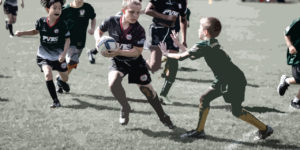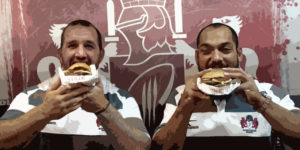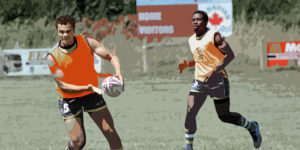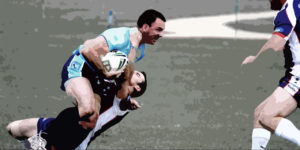
Youth rugby warm-up for muscle activation
A well-executed warm-up should improve your performance and may also reduce your risk of injury. This is especially true for youth rugby players – they are the future of the sport!

A well-executed warm-up should improve your performance and may also reduce your risk of injury. This is especially true for youth rugby players – they are the future of the sport!

Carbs are neither good or bad and blanket media statements like “carbs make you fat” are very unhelpful. As a rugger, your gameday nutritional requirements are very different from a couch-surfer who never walks further than the fridge and back.

Need to get bigger this pre-season? Don’t get the grill out just yet. A study by researchers in Brisbane has revealed that increased protein distribution has NO effect on changes in lean mass during a rugby pre-season.

Ruggers are constantly sore due to inflammation. For some, this is a badge of honor but, the reality is that constant inflammation is not good for you and could lead to serious illness in the not-too-distant future.

While we all dream of playing better rugby than we’re likely capable, new research shows that the world’s elite rugby players share a huge number of genetic similarities. Rugby might be in your genes!

A study has revealed that rugby forwards were three-times more likely to develop non-alcoholic fatty liver disease (NAFLD) than backs. That is a very significant increase in risk and something we should address in our training and diet programs.

Muscle soreness is part and parcel of rugby. But DOMS isn’t an accurate measure of training performance. And N-Acetylcysteine isn’t the best way to treat it.

Before you sacrifice a chicken to the rugby gods in an effort to win back your progress, it’s important to understand what a plateau is, and what you can do about it. Training or Rest? You might need the later.

If the subject of nutrition leaves you feeling dazed and confused, ignore all the pseudo-science and marketing hype and simplify your in-season rugby diet.

Head and neck injuries are relatively rare in rugby but, because of their potential severity, anything you can do to reduce your chances is time well spent. Include neck exercises in your workouts and protect your head at all times.
Can’t find what you’re looking for? Don’t forget, some of the best content on staging-rucksciencecom.kinsta.cloud is available for free in the programs section of our website. There, you’ll find dozens of eBooks that can help you in your life-long journey to learn rugby. There’s something for everyone, whether you’re coming from a point of significant knowledge or whether you’ve only just started learning how to play rugby.
Still can’t find the right rugby blog?
We’ve done our best to compile the most comprehensive library of programs possible. But there’s every chance we missed something. Would a particular blog topic help you to learn rugby faster? Would a new eBook give you the info you need to train more effectively? Then we want to hear about it! Get in touch with our content team here and you’ll also receive a special gift to redeem on our website.
The materials and information provided in this presentation, document and/or any other communication (“Communication”) from Ruck Science, LLC or any related entity or person (collectively “Ruck Science”) are strictly for informational purposes only and are not intended for use as diagnosis, prevention or treatment of a health problem or as a substitute for consulting a qualified medical professional. Some of the concepts presented herein may be theoretical.
References to any non-Ruck Science entity, product, service, person or source of information in this or any other Communication should not be considered an endorsement, either direct or implied, by the host, presenter or distributor of the Communication. The host(s), presenter(s) and/or distributor(s) of this Communication are not responsible for the content of any non-Ruck Science internet pages referenced in the Communication. Ruck Science is not liable or responsible for any advice, course of treatment, diagnosis or any other information or services you chose to follow without consulting a qualified medical professional. Before starting any new diet and/or exercise program, always be sure to check with your qualified medical professional. For details of our affiliate program please see our Terms & Conditions. Click here for our Privacy Policy